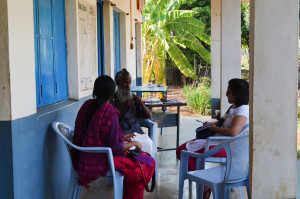Serious human rights violations occur across the world on a daily basis, yet very few, if any, are reported, either in the international media, academia or in the public sphere more generally. Fact finding missions allow for these violations to be documented and publicised and therefore create a space where human rights violations can be exposed and hopefully, in the future, prevented.
The activists from the Initiative on a fact finding mission to Chhattisgarh
Undertaking fact finding missions is a key strategy of the Reproductive Rights Initiative. The Initiative has conducted numerous fact findings in thirteen Indian states since 2011. Fact finding reports are used by the Initiative to support legal and social interventions on a wide range of reproductive and sexual rights. The Initiative has coordinated fact findings on subjects as diverse as the international surrogacy industry, child marriage, unsafe and unlawful sterilization and medical services available to pregnant and lactating homeless women. By working closely with local activists, advocates and NGOs, the Initiative ensures that its fact findings are as accurate, informative and reliable as possible. The Initiative has successfully utilised fact finding reports as evidence of human rights violations in the Indian courts and as advocacy tools to show the need for higher standards of reproductive and sexual rights.
Research & Fact-finding
Fact finding report on Poor quality of health care and services: A case study of North Cachar district, Assam
Haryana, Maternal Health, Research and Fact Finding
The fact finding is conducted in Assam which has the highest number of maternal deaths in the country. The social, economic and institutional failure leads to increasing rate of maternal mortality and morbidity.
There are many international conventions which relate to Right to Health and India being a party to
....
Read More.
Visit to Matritva Chaya Shelter Home for Pregnant and Lactating Women, Jahangir Puri
Maternal Health, New Delhi, Research and Fact Finding
A team from Human Rights Law Network (HRLN) comprised of Abhiti Gupta and Briana Olson, (hereafter “the team”) visited Matritva Chaya Shelter Home (hereafter “the shelter home”) on the mornings of 7th and 11th March 2013 to determine its functionality, capacity, and current use.
The shelter home is not centrally
....
Read More.
Fact-Finding Mission to Matritva Chaya Shelter Home for Pregnant and Lactating Women, Sarai Rohilla
Maternal Health, New Delhi, Research and Fact Finding
A team from Human Rights Law Network (HRLN), comprised of Abhiti Gupta and Briana Olson, (hereafter “the team”) visited Matritva Chaya Shelter Home for Pregnant and Lactating Women at Sarai Rohilla (hereafter “Sarai Rohilla shelter” or “the shelter”) on 2nd March 2013 and did a follow up visit on
....
Read More.
Fact-Finding Report on Sterilization, Access to Contraceptive Information and Services, and Women’s Health in Bilaspur
Access to Contraceptives, Chhattisgarh, Research and Fact Finding, Sterilisation
An 8 November 2014 a sterilization camp resulted in 15 deaths in Takhatpur Block in Sakri, Bilaspur District, and Chhattisgarh. On 10 November 2014 doctors conducted sterilization camps in Gaurella Block at Gaurella, Marwahi, and Pendra. One woman died as a result of the Gaurella camp. Some women remain
....
Read More.
Maternal Death in Bilaspur District, Chhattisgarh
Chhattisgarh, Maternal Health, Research and Fact Finding
On 2 March 2015, Janko Bi died as a result of the State’s failure to ensure women’s fundamental right to survive pregnancy in Bilaspur District. It took a government ambulance one hour to reach her home. A pediatrician examined Janko Bi five hours after her family called the ambulance
....
Read More.
Litigation
- Presentations from the Two Day Webinar on Reproductive Rights on 23rd & 24th of May, 2020
- Patna High Court: Ration facility for all transgender persons
- Nikhil Datar vs. Union of India: A long drawn struggle
- Patna High Court gives favourable order in response to the PIL on water logging in the state
- Guwahati High Court delivers landmark judgement; Department of Health and Family Welfare to pay Twenty Five Lakh Rupees to Petitioner in Nagaland
Fact Finding
- Presentations from the Two Day Webinar on Reproductive Rights on 23rd & 24th of May, 2020
- Report on the State level Consultation in Arunachal Pradesh on 2nd & 3rd November, 2019
- Sexual and Reproductive Health Rights Dictionary
News
- Report of the two day webinar on ‘Access to Reproductive Justice’ on 23rd & 24th May, 2020
- Report of the National level consultation on Trans people and women’s issues- 28th & 29th December, 2019
- Nikhil Datar vs. Union of India: A long drawn struggle






